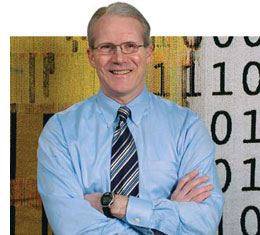
A large delegation from Carnegie Mellon traveled to Doha, Qatar, recently for the dedication of the new building for the Carnegie Mellon Qatar campus. The building can only be described as spectacular, larger than any building on the Pittsburgh campus, with an amazing sense of openness and space.
I was pleased to see the dedication of our faculty, staff and students to recreating in Doha our unique form of computer science education, combining deep thinking with real-world problem solving, in a part of the world with an educational system that's been more traditionally based on rote memorization. Both the building and the social and intellectual environment have proved so compelling that many of our recent graduates return to help students with their assignments.
Meanwhile, back in Pittsburgh, construction of the Gates Center for Computer Science and the Hillman Center for Future-Generation Technology continues, and both buildings move toward completion by the end of this summer. These buildings also will be spectacular, but in ways that are incomparable to the Qatar building. The Pittsburgh buildings are strikingly bold and innovative in their design, but in a way that integrates well into the rest of campus.
The role of the buildings in forming a connection to the rest of campus, including the Randy Pausch Memorial Bridge between Gates and the Purnell Center, mirrors the way that computer science and computer technology play pivotal roles in connecting the intellectual endeavors of all of Carnegie Mellon.
Randy used to say that if there's an elephant in the room, it's important to talk about it. In that spirit, let me talk about how the current worldwide financial crisis is affecting the School of Computer Science and Carnegie Mellon University.
We are not immune to the hardships everyone is facing. The university's endowment is down, many of our industry sponsors have been forced to cut back their support, students and their families are finding it difficult to pay the high cost of education, and funding from the U.S. government has been at best flat over the past several years.
On the other hand, we have reason to believe that we will continue to thrive as an organization. On the whole, Carnegie Mellon depended on its endowment income for just 6 percent of its operating budget --- a relatively small amount. Our research has been funded mostly by federal grants, and there are signs that this source of income will become stronger, in part due to some of the stimulus initiatives.
Our application rate for undergraduate, masters and PhD programs remains very high. Students appreciate the value that a Carnegie Mellon computer science education can provide. We are, of course, evaluating many programs and looking for ways to reduce our expenses, but overall we feel confident we will continue to flourish.
The people in our organization have demonstrated a remarkable ability to seek out and adapt to new opportunities. This has allowed us to evolve with the times, without compromising our ability or desire to conduct world-class research and education.
I was pleased to see the dedication of our faculty, staff and students to recreating in Doha our unique form of computer science education, combining deep thinking with real-world problem solving, in a part of the world with an educational system that's been more traditionally based on rote memorization. Both the building and the social and intellectual environment have proved so compelling that many of our recent graduates return to help students with their assignments.
Meanwhile, back in Pittsburgh, construction of the Gates Center for Computer Science and the Hillman Center for Future-Generation Technology continues, and both buildings move toward completion by the end of this summer. These buildings also will be spectacular, but in ways that are incomparable to the Qatar building. The Pittsburgh buildings are strikingly bold and innovative in their design, but in a way that integrates well into the rest of campus.
The role of the buildings in forming a connection to the rest of campus, including the Randy Pausch Memorial Bridge between Gates and the Purnell Center, mirrors the way that computer science and computer technology play pivotal roles in connecting the intellectual endeavors of all of Carnegie Mellon.
Randy used to say that if there's an elephant in the room, it's important to talk about it. In that spirit, let me talk about how the current worldwide financial crisis is affecting the School of Computer Science and Carnegie Mellon University.
We are not immune to the hardships everyone is facing. The university's endowment is down, many of our industry sponsors have been forced to cut back their support, students and their families are finding it difficult to pay the high cost of education, and funding from the U.S. government has been at best flat over the past several years.
On the other hand, we have reason to believe that we will continue to thrive as an organization. On the whole, Carnegie Mellon depended on its endowment income for just 6 percent of its operating budget --- a relatively small amount. Our research has been funded mostly by federal grants, and there are signs that this source of income will become stronger, in part due to some of the stimulus initiatives.
Our application rate for undergraduate, masters and PhD programs remains very high. Students appreciate the value that a Carnegie Mellon computer science education can provide. We are, of course, evaluating many programs and looking for ways to reduce our expenses, but overall we feel confident we will continue to flourish.
The people in our organization have demonstrated a remarkable ability to seek out and adapt to new opportunities. This has allowed us to evolve with the times, without compromising our ability or desire to conduct world-class research and education.
For More Information:
Jason Togyer | 412-268-8721 | jt3y@cs.cmu.edu

